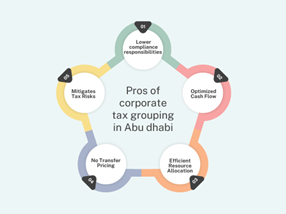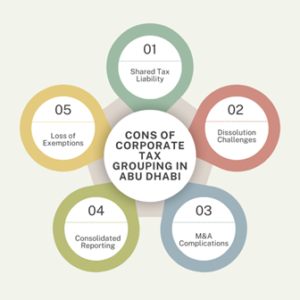Abu Dhabi introduced corporate tax regulations to comply with global tax standards. Businesses in the UAE have the strategic choice of corporate tax grouping, which has many tax-related benefits.
However, setting up a tax group involves adhering to the rules and compliance requirements of Abu Dhabi corporate tax laws.
This blog will guide you through the requirements for establishing a tax group in Abu Dhabi and mention their possible pros and cons.
Key Takeaways
- Corporate tax grouping in Abu Dhabi allows multiple entities to be treated as a single taxable entity, provided they meet criteria like ownership, residency, and financial control.
- Key benefits include simplified compliance, no transfer pricing, optimized cash flow, and efficient resource allocation, but drawbacks involve joint liability, dissolution challenges, and loss of individual tax exemptions.
- The FTA has the authority to reject or terminate tax groups if eligibility conditions are unmet, risks to public revenue arise, or administrative burdens increase.
What is a corporate tax group?
Corporate tax grouping is a provision in the Abu Dhabi corporate tax legislation which enables two or more business entities to be regarded as a single taxable person.
Businesses must fulfill several requirements to create a corporate tax group and take advantage of its unmatched benefits.
Abu Dhabi companies can learn about taxation grouping regulations by consulting with corporate tax advisors.
A parent company, in addition to one or more subsidiaries, can submit a proposal to the FTA to establish a Tax Group, given they fulfill the following criteria:
- Corporate Structure: Every entity should be a juridical individual, such as an LLC.
- Residency: Each participant in the company must be UAE residents.
- Ownership: At least 95% of each subsidiary’s share capital and voting rights should belong to the parent business.
- Financial Control: At least 95% of the net assets and income of each subsidiary must be under the parent company’s control.
- Uniform Financial Practices: All organizations are required to use uniform accounting standards, such as IFRS, and synchronize their fiscal years.
- Exclusions: Qualifying free zone entities and exempt individuals are not eligible.
What is the process for forming a tax group?
After each member who wishes to establish a tax group has individually adhered with the criteria for eligibility, it must be defined whether the organization as a whole is qualified to register for VAT.
The organization will be qualified if it adhere with either one of the following requirements:
- If a minimum of one member meets the registration requirements.
- The combined value of VAT-liable supplies and purchases of the group meets the registration threshold
The next phase in the registration procedure includes the members of a tax group nominating one member among them as the representative participant of the tax group. The tax returns of the group will be submitted in the name of this representative participant.
If none of the group members have ever been registered for VAT, a VAT registration application and a tax group registration application must be submitted by the prospective representative member. If members are already registered for VAT, only the tax group registration application needs to be submitted.
Pros and cons of corporate tax grouping in Abu Dhabi
The following are the pros of forming a Corporate Tax Group:

1. Lower compliance responsibilities
According to UAE corporate tax law, a tax group may only apply for one corporate tax registration on behalf of all of its member firms. Additionally, the tax group must file a single consolidated return rather than individual returns for each member company. This lowers the cost of compliance and streamlines the tax group’s overall administration process.
The process of tax compliance can be streamlined for businesses by combining income, losses, and costs into a single report. Simplified reporting lowers the possibility of non-compliance penalties and the possibility of mistakes in tax returns.
2. No Transfer Pricing
Transfer pricing rules do not apply to transactions between tax group members. The burden and difficulty of demonstrating fair market value for intra-group agreements are significantly reduced as a result.This will reduce the administrative strain of maintaining current transfer pricing records.
3. Optimized Cash Flow
Tax grouping can lower the upfront tax liability, increasing the group’s overall liquidity.
For instance, if a firm in the group has a high tax liability and another has unused losses, the offsetting mechanism can lessen the amount of money that must be paid in taxes.
Companies are able to allocate funds for expansion or operational activities rather than being tied up in tax payments due to this optimized cash flow.
4.Efficient Resource Allocation
For tax purposes, internal transactions—like asset transfers between group members—are not taken into account, which could result in further financial benefits.
5. Mitigates Tax Risks
For groups operating internationally, corporate tax grouping in Abu Dhabi provides a stable and efficient structure for local operations, reducing exposure to double taxation or transfer pricing disputes.
The following are the cons of forming Corporate Tax Group:

1. Shared Tax Liability
Every member of a tax group is jointly and severally liable for the corporate tax liabilities of the entire tax group. This suggests that group members are accountable for fulfilling their individual and collective corporate tax obligations. Therefore, other members may be held liable for paying the full company tax debt if any member refuses to pay their individual part.
2. Dissolution Challenges
The procedure of dissolving a business tax group can be difficult and expensive. Businesses may need to recalculate prior tax liabilities and restate their financial situations, which can be a tedious administrative task.
Inaccuracies made during this procedure may lead to fines or extended tax authorities’ investigation. Furthermore, disbanding the organization would cause problems with operations and financial planning, which would make the changeover difficult for companies.
3. M&A Complications
Getting into or out of a tax group might make mergers and acquisitions more difficult. The companies’ tax positions may need to be modified in response to changes in the group’s structure.
4. Consolidated Reporting
Consolidated financial statements prepared in compliance with applicable accounting standards are mandatory for tax groups. This could complicate the accounting process overall and increase the cost of compliance compared to preparing individual financial statements.
5. Loss of Exemptions
The corporate tax law provides a taxable person with a basic exemption level of AED 375,000/-, above which there is no tax.
By creating a tax group, the AED 375,000 threshold limit is applied to the entire group as a whole rather than to each entity separately. Businesses lose their individual exemption limit when they group together.
Termination of a Tax Group under the UAE Corporate Tax Law
Any of the following situations would result in the termination of a tax group:
- On Application: The Federal Tax Authority may receive an application from the parent firm for termination. The tax group may be disbanded upon consent.
- Failure to meet Conditions: The tax group may be dissolved if the parent firm does not fulfill the requirements established by the government for its formation.
- Replacement of Parent Company: In any of the following situations, the parent company of a tax group may request to the FTA to be replaced by another parent company to prevent terminating the tax group.
The new parent firm fulfills all of the conditions specified for the prior parent company. If the former parent firm no longer exists, the new parent firm or subsidiary is regarded as the universal legal successor.
Can the FTA deny an application to create or amend a group?
In general terms, the FTA has the authority to reject a tax group’s application if it believes that creating, changing, or disbanding the organization will pose a significant danger to public revenue.
Applications to create a tax group or add members to an existing tax group may be denied by the FTA if:
- Members who applied did not match the eligibility requirements to join a group.
- According to the FTA, the adjustment will significantly increase the possibility of tax evasion.
- The FTA anticipates that the adjustment will lower the total amount of taxes owed to them.
- The FTA believes that the adjustment will cause a considerable increase in their administrative burden
Final thoughts
For enterprises in Abu Dhabi, corporate tax grouping can be a useful instrument for effectively managing tax liabilities. However, before choosing this arrangement, it is crucial to thoroughly assess the group’s ownership patterns, financial structure, and long-term goals.
Businesses can embrace corporate tax grouping by carefully considering the pros and cons, ensuring that their tax plan complies with legal requirements and aligns with their operational objectives. They can also consult tax experts to maximize benefits.


